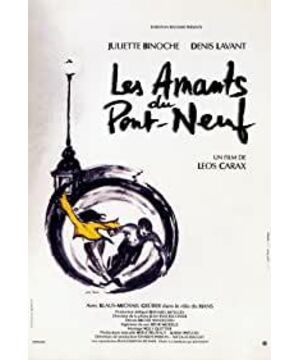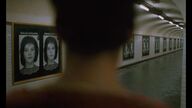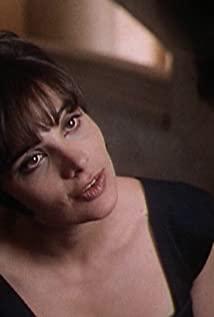Written at the beginning: The author of this article is inexperienced, with basically zero theoretical knowledge (usually dabbling in academic works mainly for film reviews of friends and neighbors), and the choice of words and sentences is very blunt. If you see any ridiculous views and comments, please criticize.
Exploding fireworks in an instant, silent film-style exaggerated body interpretation, poetic and romantic dialogue, speed competition between characters and environment, high-speed motion blurred shots, cross montage of long and short mirrors... Karax dialectically inherits the genre characteristics of the new wave , and completely digested it into his own thing, he used a lot of insolent and enthusiastic audio-visual elements and flexible editing grammar to make a classic love story into a completely "new" movie. But "Xinqiao Lovers" is by no means a romantic body. It can even be said that the film has gone to the opposite side of "romantic" without the audience being aware of it.
After reading the whole film for the sixth time, what I can be sure of is: "The New Bridge Lovers" is an exquisite hoax arranged by Karax, and to some extent "The New Bridge Lovers" is a cruel and morbid SM In erotic films, the characters are also portrayed as marginal people with powerful self-destruction and destructiveness, and the genius of Karax is to put a layer of extreme romance and crazy camouflage on such a story. Its theme is never about love, but about freedom.
One: Lovers of Xinqiao, people who love Xinqiao
Start with a question to study the relationship between the two: Did Michele really love Alex?
That inexplicable confession scene was the entrance to the crack.
Alex writes a "confession code" to Michele after an indulgent carnival on Bastille Day. When Michele woke up the next morning, she just glanced at Alex and said, "Don't bother me, I'm drinking too much", and the notebook put back in Michele's bag showed that she had apparently read the signed message. At this time, Alex would naturally think that Michele's move was rejecting Alex's confession. But soon after, the two successfully "matched the code" and raised doubts: why Michele changed her mind. In fact, there is no so-called change, because the sentence "the sky is white" is not for Alex.
The confession scene begins with a rare scene of three people in the same frame in the entire film.
In the panorama, no matter the position, the orientation of the sideways posture, the orientation of the sight of the right eye (blind in the left eye), Michele is more inclined to a gesture of dialogue with Hans. This is even more so for the next shot, where Karax uses a telephoto lens to make Michele appear to be leaning next to Hans, while Alex and Michele are separated by a considerable distance.
Then, Michele seemed to say casually: "Today the sky is white", Alex turned around in surprise, but Hans replied casually: "What?" (Looking casually) Say it again: "The sky is white".
But Michele couldn't wait for Hans' response in the end. Alex walked up to her tremblingly, like a child bowing his head and admitting his mistake in the unequal composition of the two - sorry for disappointing you, it was me. Michele's next series of reactions were all restrained interpretations of this disappointment. She put down her hand that was about to tie her braids and kept looking away to avoid Alex's gaze. The angle of the camera selection also ensured that the audience would never know the eyes of the two. Is there a meeting; then she briefly (seemingly nonchalantly) turns her head to look at Hans, as if in her last struggle - are you sure it's not you. But in order not to let this emotion show, she turned her head back quickly and looked at Alex, and the face that had been briefly and partially bathed in sunlight was once again hidden in dim shadows.
The breach has been torn open, but with it comes more problems.
To find out, let's go back to the beginning of the video for now.
The three appearances of the three main characters reflect the state process of the three people in the whole film-Alex seems to appear in the middle of the road out of thin air. Wandering in the land; Michele suddenly appeared on one side of the road and walked along the zebra crossing to the other side of the road. For her, wandering was just an accidental escape on the track of normal settled life; On the new bridge, it looks like wandering, but it is just another form of settlement, as he later showed Michele a bunch of keys, which is a testament to his ability to settle.
Michele has a history, Hans has a history, only Alex is like a ghost, no one knows where he came from and where he's going. Alex yearns for wandering, truly free wandering, throwing away the burden of history and stepping out of the cycle of natural time. His wandering is dematerialized, always maintaining a state of "lack".
Michele's wandering is accompanied by two "deficiencies", physical deficiencies (ie eye disease) and emotional deficiencies (ie lovelorn), the latter being the original motive for Michele's wandering. But unlike Alex where lack is the norm, Michele takes every opportunity to fix it.
Michele's dedication to repairing the "deficiency" of the eyes comes from her love for painting; while her demand for repairing emotional deficiencies has reached a certain poetic connection with the former. Before she fell in love, she only painted old lovers. She has been looking for another person who can make her draw again and again. But the worsening eye disease makes the repair journey even more difficult, and she must make a decision as soon as possible.
She used alcohol to drown out the last thought of her old lover, but at the same time, alcohol seemed to make her forget the wild dance with Alex on the night of fireworks, so that she was still indifferent after seeing the unsigned confession message the next day. Dispatched Alex who came in a hurry. Alex wanders the streets in despair, but gives Hans "a chance". So there is the longest dialogue between two people in the whole film (up to five and a half minutes), Michele poured out her dilemma (can't see the painting), and Hans first showed her the solution to the dilemma (museum key) , then shared his story with his late ex-wife and said that crucial line: "She's a bit like you." At this point, the mystery in Michele's mind finally took shape: Was the unsigned confession message written by Alex or Hans? It can be seen from the position in the panoramic shot that Michele is obviously more willing to believe what Hans left, or that she prefers to be loved by Hans, because no matter from her current emotional appeal or her obsession with painting See, Hans is a better choice, but the reality is not what Michele wants.
And Michele still chose to accept Alex later, because she decided to change her inner drive from the recognition of "being loved" to the self-evidence of the ability to "love" (this is why she often said to Alex: You have to treat me patient).
She took Alex to the disco and roller coaster, but Alex was not interested at all; she waved the stolen money and shouted "Have you seen the sea?", but Alex responded "it's not necessary"; she took Alex to see Sea, Alex "only looked at his feet". She'd done her best to accompany Alex to madness and indulgence (or so she thought), and all he said was: go back to the bridge.
From this, we can also get a glimpse of the cunning of Karax - under the surface of romance, there are always questions and jokes about romance: Michele expects Hans's answer, but waits for Alex; thinks she works hard to love Alex, And taught Alex how to fall asleep, the latter turned to open the bottle of sleeping pills.
The "freedom" that Michele understood was not the idealized "freedom" that Alex aspired to - even if he did love Michele - it was too materialistic. He said: "Going back to the bridge, and the first thing he did when he got back to the new bridge was to use a prank to drop the box full of money into the river. Alex's wandering cannot accommodate the existence of "money". His idealized free wandering is based on the state of "deficiency", while "money" is on the contrary, it fills the gap.
What Michele brought to Alex is actually a variant of the material advocacy of the consumer society. It is separated from the new bridge (the name of "freedom"), but it is called the name of romance and madness. Karax turns it into an image. Fast blinking lights. And Alex hates lights (hence Aelx's most common pose in the whole film is to cover his eyes, while Michele and Hans only cover their eyes when they sleep), his freedom is the freedom of fire, it's not tied to something It has a fixed form and can burst out powerful energy in an instant, with a tendency to self-destruct and destroy. Although both are dazzling and flickering, the flame itself, as a symbol of raw power, is almost the opposite of the light of the consumer society, and Michele clearly misunderstood the two.
What's more, when watching Alex's fireworks show, Michele appeared "vertigo" twice, and the superimposed picture also corresponds to the picture of Alex burning the missing poster in the latter part of the film.
But Michele still recorded Alex's firework display on the drawing paper, and when he told Hans about the pain of his eye disease, the picture flashed back to the scene of Alex breathing fire.
Alex's fireworks left an indelible impression on Michele while destroying his eyes. So, when Michele's eye disease is getting worse, how does she paint? - by memory. Throughout the whole film, we will find that the two paintings about Alex drawn by Michele under the condition of eye disease are all drawn from memory. It can be said that the shirtless Alex is the embodiment of fire, and Michele's eyes obviously can't bear the long viewing time.
On the one hand, Alex amplifies Michele's physical "lack" with his unrestrained burning, while on the other hand, Michele strives to cater to Alex's burning of her in order to fill in his emotional "lack" - a kind of abuse and masochism. relation.
A concept is introduced here: the "fourth protagonist" of the film - Shimbashi.
Like Alex and Michele, Shimbashi came out and was incomplete, and the end of this lack of state was also completed by the national repair force (more on this later). The difference is that the new bridge seems to be cut off from the world because of its incompleteness, and it has become a utopia away from the world. For Alex, as long as the new bridge remains lacking, it is synonymous with freedom.
At this point, another meaning of the title has also been refined, Les Amants du Pont-Neuf is a "New Bridge Lover", but also a "New Bridge Lover".
As for whether the "lover" relationship between Alex and Michele is really established, I will extend this question to the next discussion.
Two: For the lack of freedom, for the lack of freedom
As mentioned above, Alex's freedom stems from his lack of state, the lack of ability to be autonomous. To fill the deficiency with matter is a kind of stagnation for him, but the deficiency is the vitality of his life, the continuation of his life.
But there is a force that has always interfered with Alex's lack, the repairing force of the state apparatus. This coercive mending force itself is anti-liberal, but it often wraps itself in "freedom".
The missing posters suddenly appeared in front of Alex's eyes in an exaggerated and exaggerated manner - this is a display of national power, they are not waiting to be read, but they are pervasive in occupying the public visual space. And when Alex finally destroyed all the missing posters and returned to Xinqiao to embrace Michele in a loss, by accident, the radio that Alex had previously sent to Michele also rang the missing message.
Comparing the content of the film before and after, the meaning is already obvious. At the beginning of the film, after a group of pros and cons explained the "encounter" between Michele and the fainted Alex, the patrol car representing the restoration force of the state machine stopped in front of Michele. If the car that symbolizes the modern consumer society crushes the ankle of the homeless Alex still needs to go through a journey, then the arrival of the patrol car seems to appear out of thin air. With just a second or two of engine roar to announce, its dazzling headlights take over the entire screen—a naked muscle display.
But when the shot cuts to a big panorama, the muscle show is timid: we find that its previously aggressive lights and roars are nothing but the same, and most importantly, without any warning, Michele seems to disappear out of thin air - it Can only repair Alex's ankle, but not yet have the ability to repair Michele's eyes, so she is selectively ignored. Even so, it still maintains an unquestionably strong stance on the surface, and it rudely slaps the unconscious Alex and drags him to the patrol car.
When it can't repair Michele, even if the carrier of this power drives to the front, it will ignore her, and when it can repair Michele again, the overwhelming information of missing people calls her, even if the "isolated" new bridge can't see her. dodge. We will find that the latter is essentially another naked muscle display of the state apparatus - once there is some kind of new "fix" technology, it will be announced to the world with great fanfare. And Alex, who burned the missing poster, naturally became its enemy, so just on the second day, the police found Alex with amazing efficiency and stepped into the new Utopia bridge that has never been touched by the outside world.
What Karax is ironing is not the freedom itself, as understood by the state apparatus, but the act of imposing it on individuals as the only standard of "freedom", because it deprives individuals of their right to value judgments.
In a montage of Michele running from the subway station back to the new bridge, the high-speed movement of the army's hand-held hand conveys a sense of terror with a strong sense of oppression. Under the oppressive force of the huge state apparatus, Michele struggled like a swimmer. And the music that sounded at this time was precisely the sound of the cello that she was looking for not long ago.
To break free of this suffocation, she had to run to Aelx, to the new bridge, to the alcohol, which she needed to help her forget reality.
Unlike people’s avoidance and escape, the Pont Neuf has always stood on the Seine, but the lack of Pont Neuf makes it an isolated place, a place that can temporarily avoid the powerful repairing power of the state apparatus. The irony can also be seen from this, the sign says that the new bridge is being repaired, but this so-called repair force is absent almost from the beginning to the end, only when Alex burns the missing poster, in a way, it is a response to this. It only recalls the gap in the forgotten Paris when it expresses its defiance by a mending force.
After realizing that he could not escape the repairing power of the state apparatus, Alex broke one of his fingers with a gun. He used this irreparable deficiency to fight against the forced repairing of the state apparatus.
When Michele came to see Alex, her eyes had been repaired, and we can then deduce from some details that she was married to her ophthalmologist - the emotional deficit was also repaired. She completely got rid of the subordinate status caused by lack of state in the past, and obtained the long-lost "equality", and "love" can only be established under the premise of equality. In previous Alex-dominated relationships, the "love" that sustained the physical gap that Michele was supposed to fill was abnormal, morbid, and hardly even called "love" . The "I never loved you" that Michele left to Alex was true to some extent, she had worked hard to "love" Alex, but when she finally understood that Alex was only using her physical insufficiency to maintain When the relationship between the two, she could no longer pretend.
Now, sitting in front of Alex is a "perfect man" who is no longer lacking, and Alex has become the one who needs to be repaired.
Alex told her that he was no longer lame, trying to prove that he was also a "perfect man", but a close-up of his hands paled his testimony, a physical inadequacy he could never mend, Eternal lack.
Even so, Alex still has to cover up his lack, at least not to be discovered by Michele, because in his understanding - just like the two's previous relationship situation - "lack" means subordination of status.
She told Alex that nothing was out of repair, even the new bridge had been repaired. She firmly believes that everything can be repaired, and appreciates repairing, because repairing gives her the premise of "love" (ie equality), and she can truly have the ability to "love". We can even completely deny the so-called "love" of Michele who was in a lacking state in the past, but when the "complete" Michele says "the person who dreams in the dream, you should go to see him when you wake up, I dream of you, love Wake me up", it's hard not to believe that she's really speaking.
In the end, they re-enacted their first encounter on the newly renovated new bridge.
The "complete" Michele finally paints a portrait of Alex that doesn't need to be drawn from memory. The two poured out their love to each other. But the bell reminded Michele of the outside world, and she said to Alex: Not tonight. At this time, Alex finally realized that he was actually in a subordinate position, and the reason for this situation was not because of his own physical "lack", but a social "lack". What binds Michele is her social "wholeness" (i.e. marriage). At this time, Alex was finally able to identify Michele as the abuser in the unequal relationship between the two, and the way to resist was to fall into the Seine with her.
After the contact, Michele's sudden compromise on the sand ship, and the surreal gestures of the two standing on the bow, it is not difficult to speculate that the two have actually died in the Seine.
Regarding how to love and how to pursue freedom, Karax, who is also a screenwriter, gives a transcendent answer-death.
This is a happy ending that only death can lead. Because death is an eternal, complete, utter lack, the lack of life. Michele, who is "perfect", cannot love freely because she is whole, and what she lacks is precisely "lack". And death gave her a chance, even though it was essentially a murder, but she took the initiative to say to Alex: We're going there too, right?
They have acquired an absolute, eternal lack, freed from all external repairing forces, and sailed into the distance, to the Eden of the soul.
We can say that until this moment, Michele's "love" was finally established.
Three: blue, white, red, blue
The blue of the French tricolor, which symbolizes the idea of freedom, appears as the signifier of the film's theme.
1. Tunnel
In the first shot at the beginning of the film, the car carries the camera into the dark blue tunnel, followed by the sound of the cello symbolizing the state apparatus and the society outside the new bridge, implying that this kind of "freedom" is cramped and involuntary. , imposed by external forces, with no end in sight.
2. Hans' clothes
Hans has been wearing white, blue and red clothes from the inside to the outside, like a king who was exiled to Xinqiao, dressed in the colors of the national flag, holding the key to the whole kingdom, but wearing a dirty coat to cover up his identity. He doesn't seem to take off a single piece of clothing in front of the camera at all times, even when hugging a naked Michele, which quickly cuts to the next day. There is only one exception.
After the fireworks on Bastille Day and Night, because Hans refused to provide Alex with sleeping pills, Alex, who could not sleep, left a message to Michele and went to the bottom of the bridge to throw stones to vent. At this time, Hans only appeared behind Alex in blue and white clothes - Hans took off the red symbolizing "fraternity" on his body, and warned Alex that love needs a stable life, and love can't sleep in the street.
"Look around", the blue city lights and the night wrap a naked Alex, "There is no love here", only an imposed, involuntary "freedom".
Aside from Hans' anomalous act of taking off two clothes, it's also noticeable that Alex doesn't look back at Hans throughout this entire conversation. Both of these points suggest that maybe Hans doesn't really exist at this time, or maybe he's just an externalization of Alex's tangled psychology.
3. Alex's clothes after Hans died
Hans' death to some extent became an important node in the relationship between the protagonists and the two, and the next scene after Hans fell into the water was that the two slowly walked in the tunnel, leaning against each other, as if entering a certain "twilight" stage .
The costumes of the two have also undergone major changes. Michele put on black clothes - Hans, as the signifier of a stable life, finally chose death and chose to follow in the footsteps of his deceased wife, so Michele, who was the object of the memory projection of Hans' deceased wife, had to wear mourning, which was also for her own concern for stability. Mourning for the vision of life, mourning for his painting career, mourning for his vision, Hans' death made all this irreparable. On the other hand, Alex's clothes are decorated with blue, white, and yellow patterns, and are dominated by flamboyant, bright red, indicating that Alex has temporarily dominated the relationship between the two. Status, Hans' death ensures that. Alex's flame of love blooms in the form of freedom, at the expense of loved ones mourning for freedom. Just like those missing posters burned by raging flames.
4. Wine bottle with sleeping pills
After learning that her eye problem can be cured, Michele pours Alex down with sleeping pills. The blue plastic bag that wraps the wine bottle conveys a certain playfulness - sleeping pills, as the solution to the only sleep problem that once plagued Alex, symbolize a kind of "freedom", the freedom of sleep, externalized in blue, but "Freedom" at this moment is not what Alex wants, because it also means Michele's freedom. Michele gave Alex "freedom" and gave herself freedom. She took off her black coat and threw it on Alex, who had fallen asleep - she was no longer in mourning.
5. "Fixing" in prison
A vigorous montage explains the whole process of Alex being discovered by the police, beaten, interrogated, and finally imprisoned. After the fading time came two years later, the picture was lit up and filled by the blue light released by the electric welding machine.
When the close-up is cut to the panorama, the picture is still wrapped in a dazzling blue light, and even a huge blue halo is generated in front of the lens. As a symbol of the power of the state apparatus and a representative of the "repair" institution, the prison chose the blue symbol of freedom to wrap itself, and the action of "welding" itself also has the meaning of "repair". When the next shot puts Alex in the middle shot, the blue clothes of the two prisoners in the front and the back announce the effect of "self-repair" (as if they were dyed by the blue halo of electric welding), they also form a strong impression on Alex. surrounded gesture.
And Alex in yellow is only reflected in blue when the welding machine is in operation, indicating that his "self-repair" under the coercion of the state machine is incomplete. In other words, since Alex broke one of his fingers with a gun, he declared that his "lack" was irreparable.
6. Monitoring screen
Michele and Alex are looking forward to a new bridge appointment in half a year, but at this time the camera gives a long close-up of a monitor somewhere in the prison. The gaze of the repairing power of the state apparatus is never absent.
7. The "underground color" of the two
Alex and Michele are dating on the bridge. Michele is wearing a white coat, and as mentioned above, she is now on an equal footing as a "whole" person. Alex is wearing a red sweater, revealing the blue shirt collar underneath. He shows people in a loving gesture, but he still advocates freedom in his bones.
And when Michele rejects Alex for social "integrity," the wind blows her coat off, and we find that she's also wearing blue underneath. That is to say, she also yearns for freedom to a certain extent, she is tired of "completeness", and she wants to be lacking.
8. The Seine/Death
Blue, white, and red fell into the river, and in the end there was only one color left, blue. That is the color of the Seine, the color of eternal "lack", the color of death. It means total freedom.
Therefore, after surfacing, the two did not swim to the shore, but invariably called for help to the passing sand ship. Because death is a river with no other bank.
Epilogue
Lovers at New Bridge is an elaborate romantic hoax. In this film, love is false, equality is false, and freedom is impure, which can only be possessed after death.
After watching "Lovers in New Bridge" for the first time, I was really deceived by Karax. But in the process of rewatching it again and again, even though I have gradually realized its deceptive nature and realized that romance is just its disguise, this has not affected its status in my mind (or even higher). Maybe the reality is the same. We are all blind in the face of love, and even to some extent, we are willing to be deceived and eager to be deceived.
View more about The Lovers on the Bridge reviews











